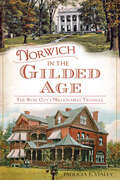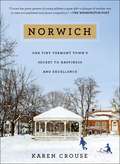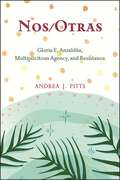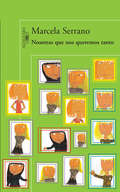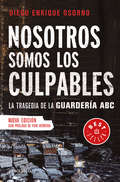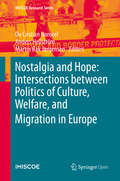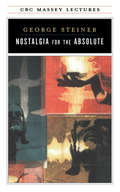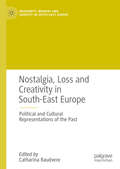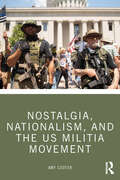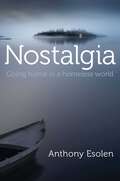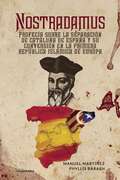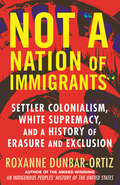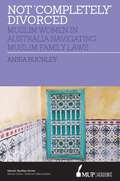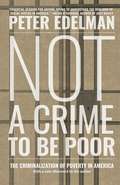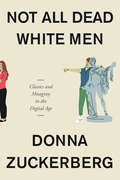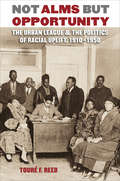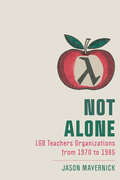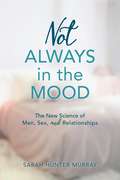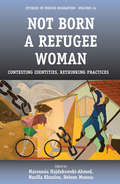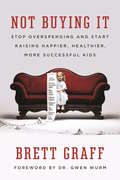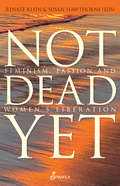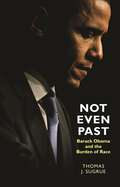- Table View
- List View
Norway To America: A History of the Migration
by Ingrid SemmingsenThis book tells the story of the migration as it affected both countries and investigates the reasons for &“American Fever.&” The story ends with a discussion of the ways in which Norwegian-Americans retain their ties to Norway. The book was first published in Norway as Dröm og Dad (Dream and Deed), in observance of the 150th anniversary of the departure of the first emigrant ship for America. This is an excellent way to celebrate one of the strongest ethnic heritages in America.
Norwich in the Gilded Age: The Rose City's Millionaires' Triangle (Landmarks Ser.)
by Patricia F StaleyA photo-filled history of Norwich, Connecticut, and the families, fashions, and fortunes of its elite nineteenth-century residents. Stroll down Norwich&’s most fashionable mile of millionaires&’ mansions and mingle with the extraordinary people who lived and played behind their elegant facades during the glamorous Gilded Age. Wealthy manufacturers and merchants constructed magnificent mansions, many of which survive today, along this trendiest triangle in the glitzy &“Rose of New England,&” conveniently nestled between Boston and New York. Tricia Staley has uncovered forgotten scandals like the Blackstone baby kidnapping and the bank cashiers who embezzled thousands of dollars from wealthy residents, as well as the drama of fortunes made and lost. Meet Tiffany&’s founding partner John Young, rubber shoe manufacturing king William A. Buckingham, the Slaters, Greenes, and Hubbards, and more salacious, stylish titans of industry and extravagance.
Norwich: One Tiny Vermont Town's Secret to Happiness and Excellence
by Karen CrouseThe extraordinary story of the small Vermont town that has likely produced more Olympians per capita than any other place in the country—and whose citizens provide a model for achieving excellence while leading a well-rounded life.Norwich, a charming Vermont town of roughly three thousand residents, has sent an athlete to almost every Winter Olympics for the past thirty years—and three times that athlete has returned with a medal. How does Norwich do it? To answer this question, New York Times reporter Karen Crouse moved to Vermont, immersing herself in the lives of Norwich Olympians past and present. There, amidst the organic farms and clapboard colonial buildings, she discovered a culture that’s the opposite of the hypercompetitive schoolyard of today’s tiger moms and eagle dads. In Norwich, kids aren’t cut from teams. They don’t specialize in a single sport, and they even root for their rivals. What’s more, their hands-off parents encourage them to simply enjoy themselves. Making it to the Olympics is seen not as the pinnacle of an athlete’s career but as a fun stop on the way to achieving other, longer-lasting dreams. Norwich, Crouse realized, wasn’t just raising better athletes than the rest of America; it was raising happier, healthier kids. Full of inspiring stories of Olympians who excelled on and off the sports field—and had a blast doing so—Norwich is the book for every parent who wants to raise kids to be levelheaded, fulfilled, and successful.
Nos/Otras: Gloria E. Anzaldúa, Multiplicitous Agency, and Resistance (SUNY series, Philosophy and Race)
by Andrea J. PittsIn a refreshingly novel approach to the writings of Gloria E. Anzaldúa (1942–2004), Andrea J. Pitts addresses issues relevant to contemporary debates within feminist theory and critical race studies. Pitts explores how Anzaldúa addressed, directly and indirectly, a number of complicated problems regarding agency in her writings, including questions of disability justice, trans theorizing, Indigenous sovereignty, and identarian politics. Anzaldúa's conception of what Pitts describes as multiplicitous agency serves as a key conceptual link between these questions in her work, including how discussions of agency surfaced in Anzaldúa's late writings of the 1990s and early 2000s. Not shying away from Anzaldúa's own complex and sometimes problematic framings of disability, mestizaje, and Indigeneity, Pitts draws from several strands of contemporary Chicanx, Latinx, and African American philosophy to examine how Anzaldúa's work builds pathways toward networks of solidarity and communities of resistance.
Nosotras que nos queremos tanto
by Marcela SerranoCuatro mujeres chilenas, a las puertas de la madurez y orillas de un lago, dan curso sin inhibiciones al relato apasionado de sus historias personales. Son vidas marcadas a fuego por la experiencia socialista de Allende y el golpe militar de 1973, pero también por la huella más íntima del amor y el dolor, el desengaño y la compasión. La narradora entrelaza los hilos de estas biografías con las de otras mujeres -amigas, hermanas-, planteando página a página los dilemas de la libertad y la sumisión, la infidelidad y el matrimonio, el trabajo y el sexo. Cuando a pocos años del fin de siglo -apagados el fragor de las utopías y la explosión del feminismo- se propone que tal vez las mujeres y los hombres provengan de «planetas» diferentes. Nosotras que nos queremos tanto ilumina la relación hombre/mujer desde una óptica femenina inédita. Sea o no esta novela el retrato en clase de un sector de la sociedad chilena y sus vicisitudes de los últimos treinta años, su lectura nos enfrenta sin concesiones a los claroscuros de la condición existencial de la mujer.
Nosotras que nos queremos tanto
by Marcela SerranoCuatro mujeres chilenas, a las puertas de la madurez y a orillas de un lago, dan curso sin inhibiciones al relato apasionado de sus historias personales.Vidas marcadas a fuego por la experiencia socialista durante el gobierno de Salvador Allende y el golpe militar de 1973, pero también por la huella más íntima del amor y del dolor, el desengaño y la compasión. Los hilos de estas biografías están entrelazados con las vidas de otras mujeres "amigas, primas, hermanas", planteando página a página los dilemas de la sumisión, la infidelidad y el matrimonio, el trabajo y el sexo.Cuando a pocos años del fin de siglo -apagados el fragor de las utopías y la explosión del feminismo- se propone que tal vez los hombres y las mujeres vivan un profundo desencuentro, Marcela Serrano ilumina su relación desde una óptica femenina inédita y enfrenta sin concesiones los claroscuros de la condición existencial de la mujer.
Nosotros somos los culpables: La tragedia de la guardería ABC
by Diego Enrique OsornoEl incendio de la Guardería ABC, en Sonora, es uno de los hechos más graves de la historia reciente de nuestro país. Este libro recopila testimonios sobre la tragedia en la que murieron 49 niños y más de 70 resultaron heridos. La desgracia llegando a quienes ni la esperaban ni la merecían; la irresponsabilidad que la propició; la complicidad de gobiernos, legisladores y jueces; la continua postergación de una investigación a fondo. Y los nombres y las imágenes de las niñas y los niños, las actividades y movilizaciones para honrarlos de la mejor manera, es decir, exigiendo castigo a los responsables, justicia para las víctimas y la adopción de medidas que impidan que la tragedia se vuelva a repetir. Todo eso y más hemos aprendido del libro Nosotros somos los culpables de Diego Enrique Osorno, que arma el rompecabezas de la tragedia. -Subcomandante Marcos Diego Enrique Osorno, uno de los periodistas que todavía reportean sobre el terreno los temas más incómodos y peligrosos, ha publicado un libro crucial para entender la bancarrota moral de nuestro tiempo. Es un documento valiosísimo que, a la manera de La noche de Tlatelolco, permite que sean las voces de los protagonistas las que expresen, primero, el dolor por la muerte de los niños, luego su incredulidad ante la protección oficial a los dueños de la guardería, y por último la organización de los padres para exigir justicia. -Yuri Herrera
Nostalgia and Hope: Intersections between Politics of Culture, Welfare, and Migration in Europe (IMISCOE Research Series)
by Anders Hellström Martin Bak Jørgensen Ov Cristian NorocelThis open access book shows how the politics of migration affect community building in the 21st century, drawing on both retrogressive and progressive forms of mobilization. It elaborates theoretically and shows empirically how the two master frames of nostalgia and hope are used in local, national and transnational settings, in and outside conventional forms of doing politics. It expands on polarized societal processes and external events relevant for the transformation of European welfare systems and the reproduction of national identities today. It evidences the importance of gender in the narrative use of the master frames of nostalgia and hope, either as an ideological tool for right-wing populist and extreme right retrogressive mobilization or as an essential element of progressive intersectional politics of hope. It uses both comparative and single case studies to address different perspectives, and by means of various methodological approaches, the manner in which the master frames of nostalgia and hope are articulated in the politics of culture, welfare, and migration. The book is organized around three thematic sections whereby the first section deals with right-wing populist party politics across Europe, the second section deals with an articulation of politics beyond party politics by means of retrogressive mobilization, and the third and last section deals with emancipatory initiatives beyond party politics as well.
Nostalgia for the Absolute (The CBC Massey Lectures)
by George SteinerWriter and scholar George Steiner's Massey Lectures are just as cogent today as when he delivered them in 1974 -- perhaps even more so. He argues that Western culture's moral and emotional emptiness stems from the decay of formal religion. He examines the alternate mythologies (Marxism, etc.) and fads of irrationality (astrology, the occult). Steiner argues that this decay and the failure of the mythologies have created a nostalgia for the absolute that is growing and leading us to a massive clash between truth and human survival. Ultimately he suggests that we can only reduce the impact of this collision course if we continue, as disinterestedly as possible, to ask questions and seek answers in the face of our increasingly complex world.
Nostalgia, Loss and Creativity in South-East Europe: Political and Cultural Representations of the Past (Modernity, Memory and Identity in South-East Europe)
by Catharina RaudvereWhere nostalgia was once dismissed a wistful dream of a never-never land, the academic focus has shifted to how pieces of the past are assembled as the elements in alternative political thinking as well as in artistic expression. The creative use of the past points to the complexities of the conceptualization of nostalgia, while entering areas where the humanities meet the art world and commerce. This collection of essays shows how this bond is politically and socially visible on different levels, from states to local communities, along with creative developments in art, literature and religious practice. Bringing together scholars from a range of disciplines, the book offers analyses from diverse theoretical perspectives, united by an interest in the political and cultural representations of the past in South-East Europe from a long-term perspective. By emphasising how the relationship between loss and creative inspiration are intertwined in cultural production and history writing, these essays cover themes across South-East Europe and provide an insight into how specific agents – intellectuals, politicians, artists – have represented the past and have looked towards the future.
Nostalgia, Nationalism, and the US Militia Movement
by Amy CooterNostalgia, Nationalism, and the US Militia Movement is an accessible primer on the contemporary US militia movement. Exploring the complicated history of militias in the United States, starting with the Revolutionary War period, this book leverages unique data from ethnographic fieldwork, in-depth interviews, and previously unseen archival materials from militia founder Norm Olson to detail the modern movement’s origin and trajectory through the attempted insurrection of January 6th and beyond. This book uses the lenses of nostalgia and settler colonialism to explain militia members’ actions and beliefs, including their understandings of both nationalism and masculinity. This approach situates militias in a broader political landscape and explains how and why they will continue to be relevant actors in American politics. A general audience will find this book approachable, and it will be of particular interest to people studying militias or other social movement organizations whose vision of an ideal nation rests on a nostalgic image of the past and potentially encourages political violence.
Nostalgia: Going Home in a Homeless World
by Anthony EsolenAlone among the creatures of the world, man suffers a pang both bitter and sweet. It is an ache for the homecoming. The Greeks called it nostalgia. Post-modern man, homeless almost by definition, cannot understand nostalgia. If he is a progressive, dreaming of a utopia to come, he dismisses it contemptuously, eager to bury a past he despises. If he is a reactionary, he sentimentalizes it, dreaming of a lost golden age. In this profound reflection, Anthony Esolen explores the true meaning of nostalgia and its place in the human heart. Drawing on the great works of Western literature from the Odyssey to Flannery O'Connor, he traces the development of this fundamental longing from the pagan's desire for his earthly home, which most famously inspired Odysseys' heroic return to Ithaca, to its transformation under Christianity. The doctrine of the fall of man forestalls sentimental traditionalism by insisting that there has been no Eden since Eden. And the revelation of heaven as our true and final home, directing man's longing to the next world, paradoxically strengthens and ennobles the pilgrim's devotion to his home in this world. In our own day, Christian nostalgia stands in frank opposition to the secular usurpation of this longing. Looking for a city that does not exist, the progressive treats original sin, which afflicts everyone, as mere political error, which afflicts only his opponents. To him, history is a long tale of misery with nothing to teach us. Despising his fathers, he lives in a world without piety. Only the future, which no one can know, is real to him. It is an idol that justifies all manner of evil and folly. Nostalgia rightly understood is not an invitation to repeat the sins of the past or to repudiate what experience and reflection have taught us, but to hear the call of sanity and sweetness again. Perhaps we will shake our heads as if awaking from a bad and feverish dream and, coming to ourselves, resolve, like the Prodigal, to "arise and go to my father's house."
Nostradamus: Profecía sobre la separación de Cataluña de España y su conversión en la Primera
by Manuel Martínez Phyllis BarashNOSTRADAMUS: Cataluña se separará de España y se convertirá en una República Islámica. La primera parte del libro es una novela basada en una profecía de Nostradamus, interpretada mediante la numerología. Cataluña se separa de España y el capital abandona Cataluña. Los nuevos dirigentes catalanes reciben con los brazos abiertos el nuevo capital que entra de los países del Golfo Pérsico. Con el paso de los años la población islámica se convierte en mayoritaria y toma el poder democráticamente. La ley islámica se impone en Cataluña y comienzan las guerras civiles y finalmente una guerra contra España. En el año 2040 se va a producir la reunificación con España, pero un comando islámico, formado por cinco mujeres, quiere matar al rey de España en su viaje a Barcelona para concluir la reunificación. <P><P> En la siguiente parte del libro, Nostradamus nos desvela la profecía maya del 2012 y nos indica la fecha exacta. En la tercera parte del libro hay numerología para todos los días del año y revela cómo nos afecta en nuestras vidas. La cuarta parte del libro es un libro canalizado y que ha estado perdido por más de mil quinientos años. La última parte es el mensaje de despedida de Nostradamus.
Not "A Nation of Immigrants": Settler Colonialism, White Supremacy, and a History of Erasure and Exclusion
by Roxanne Dunbar-OrtizDebunks the pervasive and self-congratulatory myth that our country is proudly founded by and for immigrants, and urges readers to embrace a more complex and honest history of the United States Whether in political debates or discussions about immigration around the kitchen table, many Americans, regardless of party affiliation, will say proudly that we are a nation of immigrants. <p><p> In this bold new book, historian Roxanne Dunbar-Ortiz asserts this ideology is harmful and dishonest because it serves to mask and diminish the US’s history of settler colonialism, genocide, white supremacy, slavery, and structural inequality, all of which we still grapple with today. She explains that the idea that we are living in a land of opportunity—founded and built by immigrants—was a convenient response by the ruling class and its brain trust to the 1960s demands for decolonialization, justice, reparations, and social equality. Moreover, Dunbar-Ortiz charges that this feel good‑-but inaccurate--story promotes a benign narrative of progress, obscuring that the country was founded in violence as a settler state, and imperialist since its inception. <p><p> While some of us are immigrants or descendants of immigrants, others are descendants of white settlers who arrived as colonizers to displace those who were here since time immemorial, and still others are descendants of those who were kidnapped and forced here against their will. This paradigm shifting new book from the highly acclaimed author of An Indigenous Peoples’ History of the United States charges that we need to stop believing and perpetuating this simplistic and a historical idea and embrace the real (and often horrific) history of the United States.
Not 'Completely' Divorced: Muslim Women in Australia Navigating Muslim Family Laws
by Anisa BuckleyWithin Muslim communities in Australia, there is great diversity in Islamic practice and religiosity. When it comes to marriage and divorce, however, many Muslims still wish to observe religious procedures alongside civil ones, and while marriage is relatively straightforward, divorce raises more complications. The situation of women in 'limping' marriages in particular has raised debates among Muslims and the Australian public regarding the autonomy of Muslim women and the function of community family law processes. Based upon in-depth research with divorced Muslim women, community leaders and local religious authorities, Buckley reveals the complexities facing Muslim women in negotiating family expectations, cultural norms and traditional Islamic laws. Through their stories and experiences, the Muslim women in this book demonstrate how they are able to navigate the intricacies of religious and civil processes and in so doing, are reformulating what a 'complete' divorce looks like. Islamic Studies Series - Volume 29
Not A Crime To Be Poor: The Criminalization of Poverty In America
by Peter EdelmanIn one of the richest countries on Earth it has effectively become a crime to be poor. For example, in Ferguson, Missouri, the U.S. Department of Justice didn't just expose racially biased policing; it also exposed exorbitant fines and fees for minor crimes that mainly hit the city's poor, African American population, resulting in jail by the thousands. As Peter Edelman explains in Not a Crime to Be Poor, in fact Ferguson is everywhere: the debtors' prisons of the twenty-first century. The anti-tax revolution that began with the Reagan era led state and local governments, starved for revenues, to squeeze ordinary people, collect fines and fees to the tune of 10 million people who now owe $50 billion. Nor is the criminalization of poverty confined to money. Schoolchildren are sent to court for playground skirmishes that previously sent them to the principal's office. Women are evicted from their homes for calling the police too often to ask for protection from domestic violence. The homeless are arrested for sleeping in the park or urinating in public. A former aide to Robert F. Kennedy and senior official in the Clinton administration, Peter Edelman has devoted his life to understanding the causes of poverty. As Harvard Law professor Randall Kennedy has said, "No one has been more committed to struggles against impoverishment and its cruel consequences than Peter Edelman." And former New York Times columnist Bob Herbert writes, "If there is one essential book on the great tragedy of poverty and inequality in America, this is it."
Not All Dead White Men: Classics and Misogyny in the Digital Age
by Donna ZuckerbergSome of the most controversial and consequential debates about the legacy of the ancients are raging not in universities but online, where alt-right men’s groups deploy ancient sources to justify misogyny and a return of antifeminist masculinity. Donna Zuckerberg dives deep to take a look at this unexpected reanimation of the Classical tradition.
Not Alms but Opportunity
by Touré F. ReedIlluminating the class issues that shaped the racial uplift movement, Toure Reed explores the ideology and policies of the national, New York, and Chicago Urban Leagues during the first half of the twentieth century. Reed argues that racial uplift in the Urban League reflected many of the class biases pervading contemporaneous social reform movements, resulting in an emphasis on behavioral, rather than structural, remedies to the disadvantages faced by Afro-Americans. Reed traces the Urban League's ideology to the famed Chicago School of Sociology. The Chicago School offered Leaguers powerful scientific tools with which to foil the thrust of eugenics. However, Reed argues, concepts such as ethnic cycle and social disorganization and reorganization led the League to embrace behavioral models of uplift that reflected a deep circumspection about poor Afro-Americans and fostered a preoccupation with the needs of middle-class blacks. According to Reed, the League's reform endeavors from the migration era through World War II oscillated between projects to "adjust" or even "contain" unacculturated Afro-Americans and projects intended to enhance the status of the Afro-American middle class. Reed's analysis complicates the mainstream account of how particular class concerns and ideological influences shaped the League's vision of group advancement as well as the consequences of its endeavors.
Not Alone: LGB Teachers Organizations from 1970 to 1985 (New Directions in the History of Education)
by Jason MayernickBetween 1970 and 1985, lesbian, gay, and bisexual (LGB) educators publicly left their classroom closets, formed communities, and began advocating for a place of openness and safety for LGB people in America's schools. They fought for protection and representation in the National Education Association and American Federation of Teachers, as well as building community and advocacy in major gay and lesbian teacher organizations in New York, Los Angeles, and Northern California. In so doing, LGB teachers went from being a profoundly demonized and silenced population that suffered as symbolically emblematic of the harmful “bad teacher” to being an organized community of professionals deserving of rights, capable of speaking for themselves, and often able to reframe themselves as “good teachers.” This prescient book shows how LGB teachers and their allies broadened the boundaries of professionalism, negotiated for employment protection, and fought against political opponents who wanted them pushed out of America's schools altogether.
Not Always In The Mood: The New Science Of Men, Sex, And Relationships
by Sarah MurrayMen’s sexual desire has long been depicted as high, simple, and unwavering. But the new research around men’s desire tells us this is far from true; and that good sex and relationships are suffering from these long-held misconceptions. In Not Always in the Mood: The New Science on Men, Sex, and Relationships sex researcher and relationship therapist Sarah Hunter Murray presents a lively, timely, and critical exploration of the newest, most surprising science on men and sex, shattering myths about men’s sexuality and helping today’s couples connect more deeply and authentically than ever before. <p><p> One-by-one, Murray examines the most detrimental, deep-held beliefs we as a society promote around men and their desire, and dive into how they affect our intimate relationships daily – and what to do about it. Do men actually crave and enjoy sex more than women? Do men “do the wanting” and prefer the chase? Where do they stand on sexual rejection? What’s the deal with porn? Answering these questions and more, this is a book for modern women and men alike. Moving beyond typical “here’s what he likes” sexual tips, the book empowers readers and offers a completely new perspective on sexuality that will validate men’s experiences and help their partners to a greater understanding of the psychology and emotions surrounding them.
Not Born A Refugee Woman
by Maroussia Hajdukowski-AhmedNot Born a Refugee Woman is an in-depth inquiry into the identity construction of refugee women. It challenges and rethinks current identity concepts, policies, and practices in the context of a globalizing environment, and in the increasingly racialized post-September 11th context, from the perspective of refugee women. This collection brings together scholar_practitioners from across a wide range of disciplines. The authors emphasize refugee women's agency, resilience, and creativity, in the continuum of domestic, civil, and transnational violence and conflicts, whether in flight or in resettlement, during their uprooted journey and beyond. Through the analysis of local examples and international case studies, the authors critically examine gendered and interrelated factors such as location, humanitarian aid, race, cultural norms, and current psycho-social research that affect the identity and well being of refugee women. This volume is destined to a wide audience of scholars, students, policy makers, advocates, and service providers interested in new developments and critical practices in domains related to gender and forced migrations.
Not Born A Refugee Woman: Contesting Identities, Rethinking Practices (Forced Migration #24)
by Maroussia Hajdukowski-Ahmed Nazilla Khanlou Helene MoussaNot Born a Refugee Woman is an in-depth inquiry into the identity construction of refugee women. It challenges and rethinks current identity concepts, policies, and practices in the context of a globalizing environment, and in the increasingly racialized post-September 11th context, from the perspective of refugee women. This collection brings together scholar_practitioners from across a wide range of disciplines. The authors emphasize refugee women's agency, resilience, and creativity, in the continuum of domestic, civil, and transnational violence and conflicts, whether in flight or in resettlement, during their uprooted journey and beyond. Through the analysis of local examples and international case studies, the authors critically examine gendered and interrelated factors such as location, humanitarian aid, race, cultural norms, and current psycho-social research that affect the identity and well being of refugee women. This volume is destined to a wide audience of scholars, students, policy makers, advocates, and service providers interested in new developments and critical practices in domains related to gender and forced migrations.
Not Buying It: Stop Overspending and Start Raising Happier, Healthier, More Successful Kids
by Brett GraffParents will do just about anything to give their kids happy lives and successful futures. Unfortunately, the drive to give kids the best of everything leads to a financial strategy based in fear and competition, and results in millions of dollars worth of unnecessary purchases. Enough is enough. In Not Buying It, Brett Graff, the "Home Economist,” separates the truth about what parents need for their kids to succeed from the fiction perpetuated by ads, peer pressure, and internal fear. Graff shows how parents can save up to a million dollars by investing the money they would otherwise spend on overpriced and unnecessary purchases for their kids. Graff exposes the many ways that overspending can actually harm kids by encouraging narcissism and unhealthy habits. Her tips range from the everyday (understand when supposedly "organic" products aren't worth the extra dollars) to the long-term (consider investing in a smaller home for your family, which encourages intimacy and connection), making this a valuable manual for all stages of a parent’s life. An essential book for new parents as well as parenting veterans, Not Buying It is the definitive guide for families who want to separate the truth about raising kids from the hype.
Not Dead Yet: Feminism, Passion and Women's Liberation
by Susan Hawthorne; Renate KleinWhat was it like to participate in the Women's Liberation Movement? What made millions of women step forward from the 1960s onwards and join it in different ways? Many of the fifty women in this book were there. They describe how they have contributed in multitudinous ways across politics, the arts, health, education, environmentalism, economics and science and created wonderfully subversive activism. And how they continue this activism today with determined grittiness. Here are women – all over 70 years of age – still railing against the patriarchal systemic oppression of women, still fighting back. “Don't Call Me Sweetie”, “Never Waste a Good Crisis” and “Still Here, Still Clear and Still Lesbian” are what they want us to know. The contributors to Not Dead Yet have created new analyses with new language and new kinds of organisations always aware of the ways in which the system is stacked against them, particularly against radical lesbian feminists. But they persist. They share the revolutionary zest they have carried with them over many decades. There is history, there is subversion and there are many extraordinary acts of courage. The language is full of irony and wit – as well as deadly serious.The Women's Liberation Movement had a profound effect on the lives of millions of women and in turn those women have changed the world. Young women in particular might enjoy reading the inspirational tales by their foremothers in Not Dead Yet and let their wisdom guide their own paths.
Not Even Past: Barack Obama and the Burden of Race (The Lawrence Stone Lectures #2)
by Thomas J. SugrueThe paradox of racial inequality in Barack Obama's AmericaBarack Obama, in his acclaimed campaign speech discussing the troubling complexities of race in America today, quoted William Faulkner's famous remark "The past isn't dead and buried. In fact, it isn't even past." In Not Even Past, award-winning historian Thomas Sugrue examines the paradox of race in Obama's America and how President Obama intends to deal with it.Obama's journey to the White House undoubtedly marks a watershed in the history of race in America. Yet even in what is being hailed as the post-civil rights era, racial divisions—particularly between blacks and whites—remain deeply entrenched in American life. Sugrue traces Obama's evolving understanding of race and racial inequality throughout his career, from his early days as a community organizer in Chicago, to his time as an attorney and scholar, to his spectacular rise to power as a charismatic and savvy politician, to his dramatic presidential campaign. Sugrue looks at Obama's place in the contested history of the civil rights struggle; his views about the root causes of black poverty in America; and the incredible challenges confronting his historic presidency.Does Obama's presidency signal the end of race in American life? In Not Even Past, a leading historian of civil rights, race, and urban America offers a revealing and unflinchingly honest assessment of the culture and politics of race in the age of Obama, and of our prospects for a postracial America.

